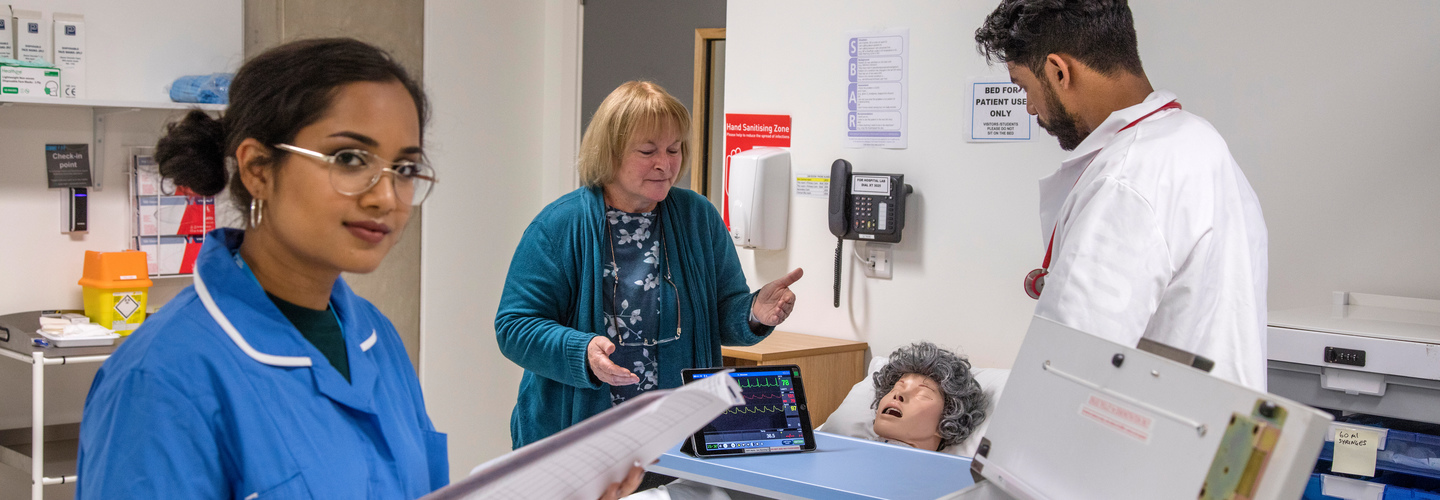MSc Physician Associate Studies
Why choose Herts?
- Fantastic Facilities: You will practice within our nationally recognised state-of-the-art simulation centre.
- Work-Related Learning: You will be exposed to local healthcare environments for real-life practical training, to maximise local employment opportunities upon graduating.
- Strong Industry Connections: Benefit from clinical placements with local hospitals and trusts including Hertfordshire University Trusts, Hertfordshire Partnership NHS Foundation Trust and GP practices.
About the course
Are you a recent graduate or mature student with a science or healthcare background or experience? Do you want to develop the “cognitive dimension” of clinical decision making and directly contribute to people’s health? If so, this course may be for you.
If you successfully complete the course and pass the national exam, you will be able to start a career in healthcare and medicine that will provide you with the opportunity to deliver person-centred, quality, patient care.
This course is a two-year intensive, clinically-focused course designed to emulate medical training at entry level and is unlike any other Masters course in the mode of delivery.
Although this is a postgraduate programme, to apply you will find this course listed within the UCAS undergraduate element.
Why choose this course?
The current major healthcare workforce challenges have led to the emergence of Physician Associates as the new rapidly evolving role within the NHS. Physician Associates support the workforce in the delivery of quality holistic care and treatment for patients, and the role is high on the agenda for commissioners and healthcare organisations. Therefore, opportunities for employment and development in the future is immense and far-reaching in breadth and scope.
As a Physician Associate, you will work autonomously under a supervising doctor or surgeon to deliver medical care to patients. The versatility of this role is such that the PA can deliver care in almost all settings within healthcare and is able to pursue and develop their area of passion and interest further upon qualification.
We're proud to have a 92% overall satisfaction score for medicine and dentistry in the Postgraduate Taught Experience Survey (PTES, 2024) and to be ranked 9th in the UK for health science (Daily Mail University Guide, 2025). You can be confident in knowing you're receiving an exceptional learning experience when you study this course.
Why University of Hertfordshire?
Our Trainee Physician Associates (TPA) have access to a whole range of benefits by studying with us. This includes:
- An engaging blended learning environment including:
- Problem-based learning opportunities
- Practical, clinical and procedural skills training equivalent to medical students
- Variety of lectures delivered by senior level clinicians and consultants
- Utilisation of a nationally recognised state-of-the-art simulation centre
- Exposure to local healthcare environment providing hands-on practical training and experience through placements to maximise the chances of local employment opportunities on qualification
- A programme led by an experienced faculty team with a combined knowledge and experience of Physician Associate training and implementation of over 30 years.
- Excellent teaching and learning at a university with a strong record of training quality health and social care students for the local system
- Interest from both local hospitals and GP practices, who are committed to recruiting graduates from our Physician Associate course
- A strong, positive student experience and bespoke support to diverse range of students to ensure they can achieve their best
- A two-year course, unlike some other universities, to minimise the cost to the student and support those who are unable to commit to a lengthier programme
What will I study?
This is a clinically-focused course, delivered through a variety of taught lectures, small group sessions, problem-based learning, practical clinical skills, and simulated learning in our state-of-the art simulation centre which is the biggest in the UK. The underpinning clinical practice element runs throughout the two years in both primary and secondary care.
Key staff
Admissions Tutor Dr Oluyinka Idowu
Find out more about Admissions Tutor Dr Oluyinka Idowu
Further course information
| Course fact sheets | |
|---|---|
| MSc Physician Associate Studies | Download |
| Programme specifications | |
|---|---|
| MSc Physician Associate Studies | Download |
| Additional information | |
|---|---|
Sandwich placement or study abroad year |
n/a |
Applications open to international and EU students |
No |
